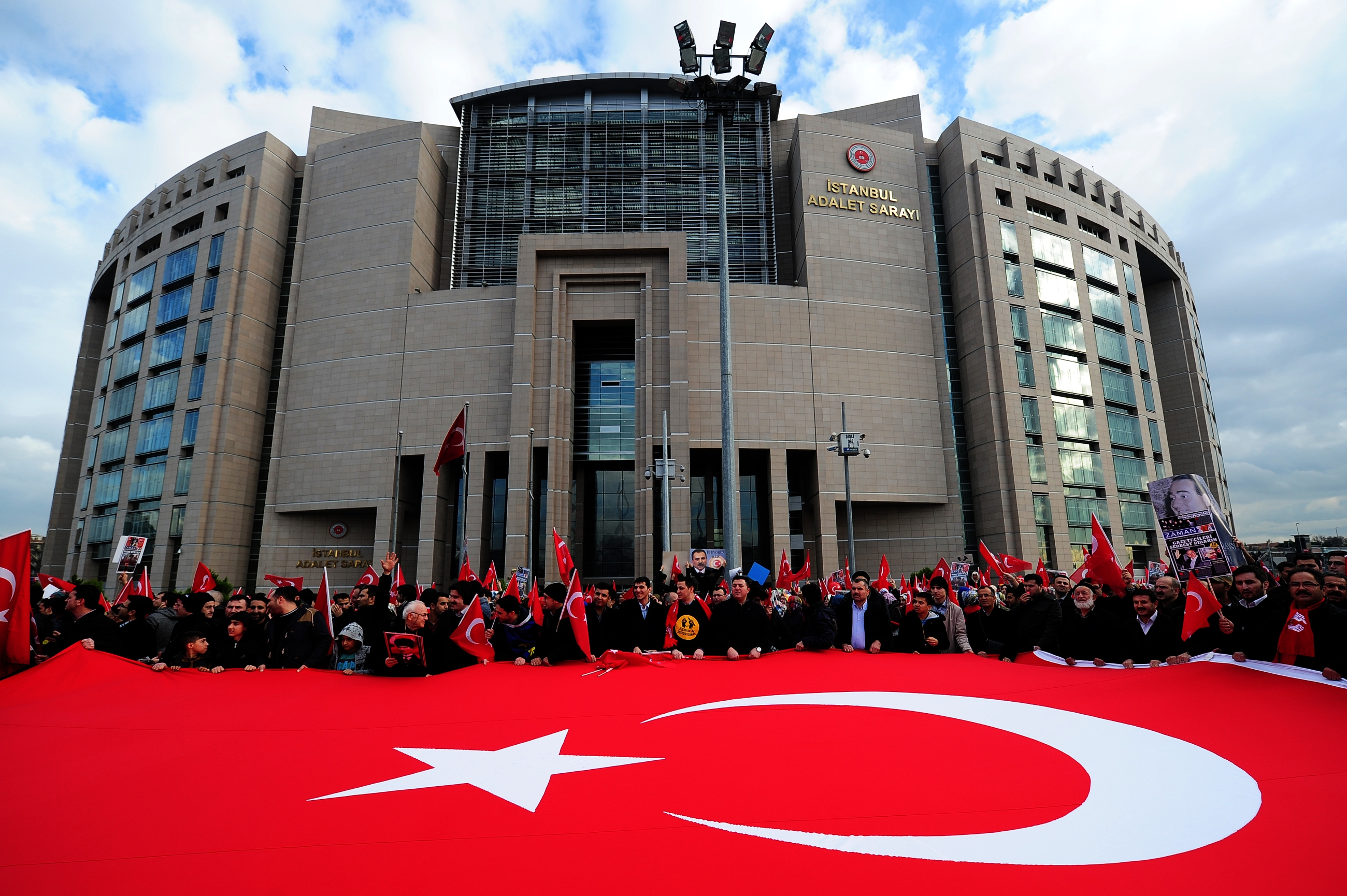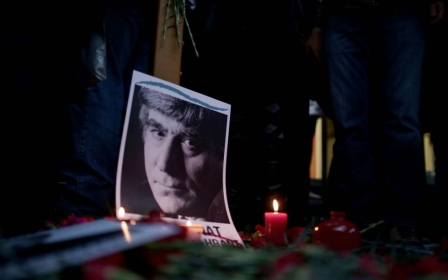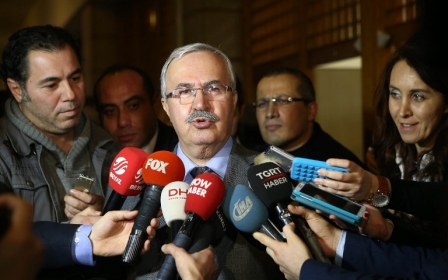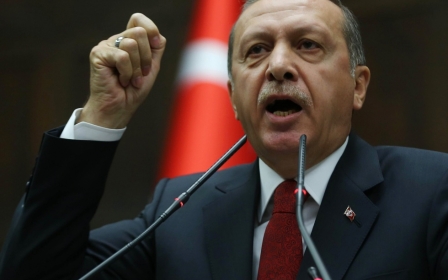Tightening media controls hurt foreign journalists in Turkey

Press freedom in Turkey has been on a deteriorating course in recent years, according to yearly Reporters Without Borders and Freedom House reports. In 2012, Turkey ranked first on the list of countries that jailed the most journalists. In 2013 and 2014 the country ranked better, as the number of jailed journalists declined respectively to 40 and 23 in the last two years, according to the Committee to Protect Journalists.
The issue is delicate: while national and international press freedom watchdogs come up with these findings, the Turkish government reiterates that those who have been detained and arrested have been prosecuted on the basis of their non-journalistic activities, including membership in terrorist organisations and violent crimes.
According to government reports, most of these individuals do not even possess a press badge and could not be considered journalists, and they have not been jailed for their journalistic activities.
In Turkey, according to the Directorate General of Press and Information, the official body that issues press badges, 15,129 journalists currently possess a yellow press card. However, the actual number of journalists is estimated to be much higher than press badge owners, as media employers are often unwilling to provide a badge for their employees. Since the costs of hiring a journalist can be even higher, some media owners also refrain from offering a formal press contract to their in-house journalists.
The case of foreign journalists
The situation - albeit to a lesser extent - affects foreign journalists based in Turkey as well. In the latest round of pressure on members of the press, a Dutch journalist, Frederike Geerdink, who is currently based in the southeastern city of Diyarbakir, was briefly detained last week for allegedly engaging in "propaganda for a terrorist organisation".
Geerdink's detention came the same day Dutch Foreign Minister Bert Koenders was paying an official visit to Turkey's capital, Ankara. It also coincided with Turkish President Recep Tayyip Erdogan's renewed claim that the Turkish media was among the freest in the world.
When she saw an anti-terrorism squad knocking on her door that day, she was told that she was "under detention". Later at police headquarters, the officials changed the wording from detention to "invitation for testimony".
"The changed wording did not represent the reality," Geerdink told Middle East Eye. "I had to go through a health check before and after the interrogation and they confiscated my phone in the meantime."
According to Turkish arrest, detention and interrogation regulations, health checks before and after the interrogation, as well as confiscation of communication devices, is official procedure during periods of detention.
When asked if she was scared, Geerdink said she was shocked at first, but her feeling turned into anger, rather than fright. "When I opened my door, I was flabbergasted, but soon after I told myself, 'this is Turkey, I should not be surprised!'"
This is not the first time that a foreign journalist has had a difficult time in Turkey. In the last year alone, non-Turkish reporters have gone through a variety of challenges on multiple occasions.
Azerbaijani journalist Mahir Zeynalov, who worked at Turkish daily Today's Zaman, the English language offshoot of the Gulen Movement, faced prosecution when "he posted tweets against high-level state officials". Facing immediate deportation, Zeynalov and his wife decided to leave the country on their own terms before the police took any action.
Zeynalov's tweets were considered to be "inciting hatred and animosity among the public", and Erdogan, then acting as prime minister, filed a case against him. His tweets were about the notorious 17-25 December 2013 corruption and bribery probe, which targeted government ministers, high-level bureaucrats and prominent businessmen.
"On February 2014, the Interior Ministry made a decision to deport me over 'insulting high-level state officials,'" Zeynalov told MEE. "But it was a part of mounting intolerance against me, built up after months of pressure by government officials and their supporters."
Zeynalov said that aside from having the necessary documentation to stay and work in Turkey, he is also married to a Turkish national, which grants him the right to become a citizen and remain in the country. While the authorities usually wait a short period of time before deporting someone, so that the individual concerned can appeal the decision, Zeynalov and his family were not given that chance.
Longstanding issues
The growing harassment of journalists was not the signature of the current Justice and Development Party (AKP, or AK Party) government until recently. In fact, during the first years of AKP rule, thanks to European Union accession prospects, there were tremendous reforms in human rights, individual rights and freedoms, press freedom, and democratic institutions between 2001 and 2005.
However, over the past few years, troubling events led the government to take drastic measures that eventually resulted in more authoritarian and intolerant rule. On one hand, mounting fault lines since 2012 between former allies, the AKP and the Gulen Movement, brought about a clandestine battle in the judiciary.
Long-time Turkey observer Andrew Finkel recently said: "For most of its time in power, the AKP has not resorted to this method [detention]." Finkel stood trial in 1999 for insulting the military in a Turkish-language article, but was later acquitted.
On the other hand, the Gezi Park protests in May 2013 changed the political climate of the country and pushed the government, as well as the opposition, to adopt a polarising political discourse, which has now become an everyday practice.
Within that kind of environment, press members were always on the frontlines, touching upon the most sensitive issues. For instance, on the first anniversary of the Gezi Park protests in the summer of 2014, Ivan Watson, CNN International's Istanbul-based reporter for the last 12 years, was detained live during their coverage.
In an interview after the incident, Watson stated that what normally could be considered an "isolated incident" became a much larger issue when Erdogan took the incident one step further by insulting Watson and saying he was caught red-handed, implying Watson was acting like a spy.
A month later, Watson left Turkey, and was reassigned to Hong Kong.
According to Asli Tunc, professor and media analyst at Istanbul Bilgi University, these isolated incidents are actually a reflection of what has been happening in Turkey over the past few years.
"On an ever-expanding course, what started with Turkish and Kurdish journalists is now affecting foreign journalists as well. People are now getting harassed live on TV or social media and no one has an exemption from it," she told MEE.
Press freedom at large
Veteran journalist Rusen Cakir recently identified three main tendencies in how the media covers the issue of Turkish press freedom.
While some media organisations saw the pressure and subsequent raids or detentions as a direct assault on press freedom, those with more pro-government positions have emphasised the non-journalistic activities of the detained journalists, Cakir wrote. A smaller group, meanwhile, has refrained from commenting altogether.
However, for Riza Turmen - former European Court of Human Rights (ECHR) judge and MP from the main opposition Republican People's Party (CHP) - the intensifying pressure on the media is highly problematic.
"When you execute such operations on media, no matter what the reason behind it, it would inevitably create a 'chilling-effect', discouraging members of the press from performing their jobs," Turmen told MEE.
"If the press is working under pressure and the fear of prosecution, self-censorship mechanisms would take over and eventually the public would suffer from this," he said.
When similar cases with Turkish and foreign journalists are considered, the legal wording plays a major role in what appears to be arbitrary practices. For instance, Geerdink said the broad wording of Turkish laws results in excessively vigilant practices.
"Terrorism laws in Turkey are so broadly defined that they do not make any distinction between someone who actually breaches the law with propaganda and someone who reports them," she said.
"Someone is waving a PKK [outlawed Kurdish armed group] flag and I am reporting it. The law does not make any distinction between the two," she added.
Regardless of the true level of intimidation, Zeyalov said that the Turkish authorities now understand that it is almost impossible to silence the foreign media. "There is always a way to report from inside the country, no matter to what degree foreign journalists are being kept on edge," he said, adding that searing reports criticising Turkey's poor record of media free do little, if anything, to keep the government in check.
In this context, Geerdink said all the journalists working in Turkey should continue doing their job. "The world is actually seeing the direction which Turkey is going and you do not have to be critical about it; you just should tell the world about what is happening."
New MEE newsletter: Jerusalem Dispatch
Sign up to get the latest insights and analysis on Israel-Palestine, alongside Turkey Unpacked and other MEE newsletters
Middle East Eye delivers independent and unrivalled coverage and analysis of the Middle East, North Africa and beyond. To learn more about republishing this content and the associated fees, please fill out this form. More about MEE can be found here.




